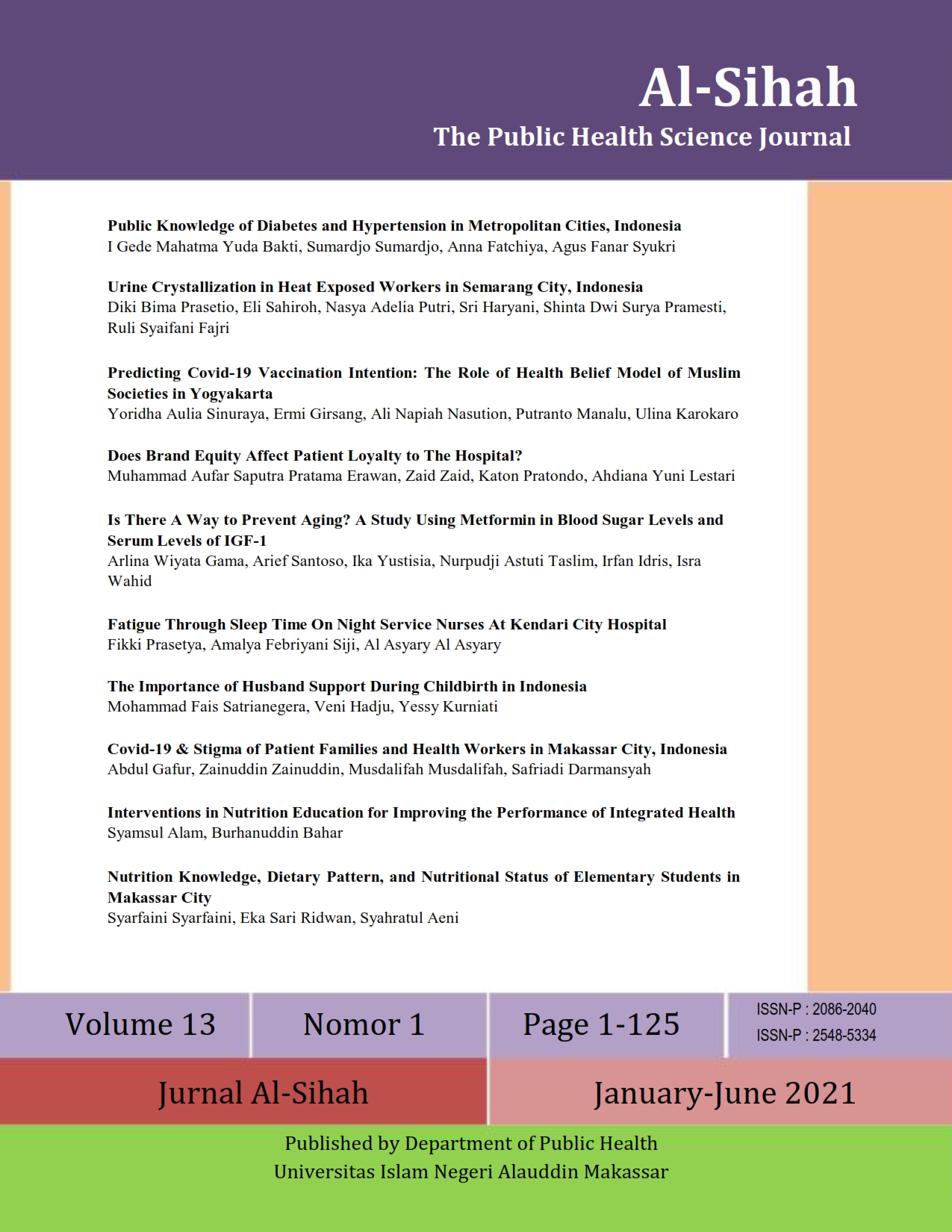Fatigue Through Sleep Time On Night Service Nurses At Kendari City Hospital
Abstract
Sleep time is the sleep time needed by nurses as a fulfillment before doing the night shift and sleeping time during the night shift to optimize work productivity to minimize work fatigue. This study aims to determine the relationship between nurses' slept time before and during shifts, slept debt, and shift rotation with fatigue on night shift nurses in the Critical Room of the Kendari City General Hospital in 2020. An analytical survey was conducted with a cross-sectional study. The results showed that there was no relationship between sleep time before the night shift and work fatigue on the night watch nurse (p-value = 0.309), in contrast to sleep time during the night shift, it was found that there was a relationship with work fatigue on the night watch nurse (p-value = 0.003 ). It is recommended that hospital management make standard operating procedures that aim to regulate nurses' sleep time during the night shift to meet their needs and reduce fatigue levels.
Downloads
References
Åkerstedt, T., Axelsson, J., Lekander, M., Orsini, N., & Kecklund, G. (2014). Do sleep, stress, and illness explain daily variations in fatigue? A prospective study. Journal of psychosomatic research, 76(4), 280-285. https://doi.org/10.1016/j.jpsychores.2014.01.005
Ayed, A., Thulth, A. S., & Sayej, S. (2015). Impact of Night Shift and Training Development Factors on Performance of Professional Nurses in North West Bank Governmental Hospitals. Journal of Education and Practice, 6(27), 50-60. https://eric.ed.gov/?id=EJ1077378
Behrens, T., Burek, K., Pallapies, D., Kösters, L., Lehnert, M., Beine, A., Wichert, K., Kantermann, T., Vetter, C., Brüning, T., & Rabstein, S. (2019). Decreased psychomotor vigilance of female shift workers after working night shift s. PLoS ONE, 14(7), 1–18. https://doi.org/10.1371/journal.pone.0219087
Benavente, S. B. T., Silva, R. M. D., Higashi, A. B., Guido, L. D. A., & Costa, A. L. S. (2014). Influence of stress factors and socio-demographic characteristics on the sleep quality of nursing students. Revista da Escola de Enfermagem da USP, 48(3), 514-520. https://doi.org/10.1590/S0080-623420140000300018
Books, C., Coody, L. C., Kauffman, R., & Abraham, S. (2020). Night shift work and its health effects on nurses. The health care manager, 39(3), 122-127. http://doi.org/10.1097/HCM.0000000000000297
Chaiard, J., Deeluea, J., Suksatit, B., Songkham, W., & Inta, N. (2018). Short sleep duration among Thai nurses: Influences on fatigue, daytime sleepiness, and occupational errors. Journal of occupational health, 2017-0258. https://doi.org/10.1539/joh.2017-0258-OA
Chaput, J. P., Dutil, C., & Sampasa-Kanyinga, H. (2018). Sleeping hours: what is the ideal number and how does age impact this?. Nature and science of sleep, 10, 421. https://dx.doi.org/10.2147%2FNSS.S163071
Dai, C., Qiu, H., Huang, Q., Hu, P., Hong, X., Tu, J., & Chen, F. (2019). The effect of night shift on sleep quality and depressive symptoms among Chinese nurses. Neuropsychiatric disease and treatment, 15, 435. https://dx.doi.org/10.2147%2FNDT.S190689
de Almeida, C. M. O., & Malheiro, A. (2016). Sleep, immunity and shift workers: a review. Sleep science, 9(3), 164-168. https://doi.org/10.1016/j.slsci.2016.10.007
Di Muzio, M., Reda, F., Diella, G., Di Simone, E., Novelli, L., D’Atri, A., & De Gennaro, L. (2019). Not only a problem of fatigue and sleepiness: changes in psychomotor performance in italian nurses across 8-h rapidly rotating shift s. Journal of clinical medicine, 8(1), 47. https://doi.org/10.3390/jcm8010047
Frenda, S. J., & Fenn, K. M. (2016). Sleep less, think worse: the effect of sleep deprivation on working memory. Journal of Applied Research in Memory and Cognition, 5(4), 463-469. https://doi.org/10.1016/j.jarmac.2016.10.001
Fullagar, H. H., Skorski, S., Duffield, R., Hammes, D., Coutts, A. J., & Meyer, T. (2015). Sleep and athletic performance: the effects of sleep loss on exercise performance, and physiological and cognitive responses to exercise. Sports medicine, 45(2), 161-186. https://doi.org/10.1007/s40279-014-0260-0
Ganesan, S., Magee, M., Stone, J. E., Mulhall, M. D., Collins, A., Howard, M. E., Lockley, S. W., Rajaratnam, S. M. W., & Sletten, T. L. (2019). The Impact of Shift Work on Sleep, Alertness and Performance in Healthcare Workers. Scientific Reports, 9(1), 1–14. https://doi.org/10.1038/s41598-019-40914-x
Garde, A. H., Nabe-Nielsen, K., Jensen, M. A., Kristiansen, J., Sørensen, J. K., & Hansen, Å. M. (2020). The effects of the number of consecutive night shift s on sleep duration and quality. Scandinavian Journal of Work, Environment & Health, c, 0–8. https://doi.org/10.5271/sjweh.3885
Geiger-Brown, J., Rogers, V. E., Trinkoff, A. M., Kane, R. L., Bausell, R. B., & Scharf, S. M. (2012). Sleep, sleepiness, fatigue, and performance of 12-hour-shift nurses. Chronobiology international, 29(2), 211-219. https://doi.org/10.3109/07420528.2011.645752
Gingerich, S. B., Seaverson, E. L., & Anderson, D. R. (2018). Association between sleep and productivity loss among 598 676 employees from multiple industries. American Journal of Health Promotion, 32(4), 1091-1094. https://doi.org/10.1177%2F0890117117722517
Haluza, D., Schmidt, V. M., & Blasche, G. (2019). Time course of recovery after two successive night shift s: A diary study among Austrian nurses. Journal of Nursing Management, 27(1), 190–196. https://doi.org/10.1111/jonm.12664
Härmä, M., Karhula, K., Puttonen, S., Ropponen, A., Koskinen, A., Ojajärvi, A., & Kivimäki, M. (2019). Shift work with and without night work as a risk factor for fatigue and changes in sleep length: A cohort study with linkage to records on daily working hours. Journal of Sleep Research, 28(3). https://doi.org/10.1111/jsr.12658
Heath, G., Coates, A., Sargent, C., & Dorrian, J. (2016). Sleep duration and chronic fatigue are differently associated with the dietary profile of shift workers. Nutrients, 8(12), 771. https://doi.org/10.3390/nu8120771
Hughes, V. (2016). Is there a relationship between night shift and errors? What nurse leaders need to know. Athens Journal of Health, 3(3), 217-228. https://doi.org/10.30958/ajh.3-3-2
Ishibashi, Y., & Shimura, A. (2020). Association between work productivity and sleep health: a cross-sectional study in Japan. Sleep health, 6(3), 270-276. https://doi.org/10.1016/j.sleh.2020.02.016
Kaliyaperumal, D., Elango, Y., Alagesan, M., & Santhanakrishanan, I. (2017). Effects of sleep deprivation on the cognitive performance of nurses working in shift Journal of clinical and diagnostic research: JCDR, 11(8), CC01. https://dx.doi.org/10.7860%2FJCDR%2F2017%2F26029.10324
Kim-Godwin, Y. S., Lee, M. H., Logan, J. G., & Liu, X. (2021). Factors influencing sleep quality among female staff nurses during the early COVID-19 pandemic in the United States. International Journal of Environmental Research and Public Health, 18(9), 4827. https://doi.org/10.3390/ijerph18094827
Kunzweiler, K., Voigt, K., Kugler, J., Hirsch, K., Bergmann, A., & Riemenschneider, H. (2016). Factors influencing sleep quality among nursing staff: Results of a cross sectional study. Applied Nursing Research, 32, 241-244. https://doi.org/10.1016/j.apnr.2016.08.007
Lee, T. Y., Chang, P. C., Tseng, I. J., & Chung, M. H. (2017). Nocturnal sleep mediates the relationship between morningness–eveningness preference and the sleep architecture of afternoon naps in university students. PLoS ONE, 12(10), 1–12. https://doi.org/10.1371/journal.pone.0185616
Lim, Y. C., Hoe, V. C., Darus, A., & Bhoo-Pathy, N. (2018). Association between night-shift work, sleep quality and metabolic syndrome. Occupational and environmental medicine, 75(10), 716-723. http://dx.doi.org/10.1136/oemed-2018-105104
Lin, S. H., Liao, W. C., Chen, M. Y., & Fan, J. Y. (2014). The impact of shift work on nurses' job stress, sleep quality and self‐perceived health status. Journal of nursing management, 22(5), 604-612. https://doi.org/10.1111/jonm.12020
Lo, W. Y., Chiou, S. T., Huang, N., & Chien, L. Y. (2016). Long work hours and chronic insomnia are associated with needlestick and sharps injuries among hospital nurses in Taiwan: a national survey. International journal of nursing studies, 64, 130-136. https://doi.org/10.1016/j.ijnurstu.2016.10.007
Nuraini, N. (2019). Hubungan Shift Kerja Dengan Kelelahan Kerja Pada Perawat Di Instalasi Rawat Inap Di Rs Herna Medan Tahun 2018. JUMANTIK (Jurnal Ilmiah Penelitian Kesehatan), 4(1), 45-56. http://dx.doi.org/10.30829/jumantik.v4i1.4061
Orchard, F., Gregory, A. M., Gradisar, M., & Reynolds, S. (2020). Self‐reported sleep patterns and quality amongst adolescents: cross‐sectional and prospective associations with anxiety and depression. Journal of Child Psychology and Psychiatry, 61(10), 1126-1137. https://doi.org/10.1111/jcpp.13288
Oriyama, S., Miyakoshi, Y., & Rahman, M. M. (2019). The effects of a 120-minute nap on sleepiness, fatigue, and performance during 16-hour night shifts: A pilot study. Journal of Occupational Health, 61(5), 368–377. https://doi.org/10.1002/1348-9585.12063
Palhares, V. D. C., Corrente, J. E., & Matsubara, B. B. (2014). Association between sleep quality and quality of life in nursing professionals working rotating shifts. Revista de saude publica, 48, 594-601. https://doi.org/10.1590/S0034-8910.2014048004939
Pepin, E., Gillet, P., Sauvet, F., Gomez-Merino, D., Thaon, I., Chennaoui, M., & Leger, D. (2018). Shift work, night work and sleep disorders among pastry cookers and shopkeepers in France: A cross-sectional survey. BMJ Open, 8(5). https://doi.org/10.1136/bmjopen-2017-019098
Ross, R., Chaput, J. P., Giangregorio, L. M., Janssen, I., Saunders, T. J., Kho, M. E., & Tremblay, M. S. (2020). Canadian 24-Hour Movement Guidelines for Adults aged 18–64 years and Adults aged 65 years or older: an integration of physical activity, sedentary behaviour, and sleep. Applied Physiology, Nutrition, and Metabolism, 45(10), S57-S102. https://doi.org/10.1139/apnm-2020-0467
Ruggiero, J. S., & Redeker, N. S. (2014). Effects of napping on sleepiness and sleep-related performance deficits in night-shift workers: a systematic review. Biological research for nursing, 16(2), 134-142. https://doi.org/10.1177%2F1099800413476571
Saleh, A. M., Awadalla, N. J., El-masri, Y. M., & Sleem, W. F. (2014). Impacts of nurses’ circadian rhythm sleep disorders, fatigue, and depression on medication administration errors. Egyptian Journal of Chest Diseases and Tuberculosis, 63(1), 145-153. http://dx.doi.org/10.1016/j.ejcdt.2013.10.001
Scott, L. D., Arslanian-Engoren, C., & Engoren, M. C. (2014). Association of sleep and fatigue with decision regret among critical care nurses. American Journal of Critical Care, 23(1), 13-23. https://doi.org/10.4037/ajcc2014191
Shiffer, D., Minonzio, M., Dipaola, F., Bertola, M., Zamuner, A. R., Vecchia, L. A. D., Solbiati, M., Costantino, G., Furlan, R., & Barbic, F. (2018). Effects of clockwise and counterclockwise job shift work rotation on sleep and work-life balance on hospital nurses. International Journal of Environmental Research and Public Health, 15(9), 1–11. https://doi.org/10.3390/ijerph15092038
Stanojević, Č., Simić, S., & Milutinović, D. (2016). Health effects of sleep deprivation on nurses working shifts. Medicinski pregled, 69(5-6), 183-188. https://doi.org/10.2298/mpns1606183s
Susanti, E., Kusuma, F. H. D., & Rosdiana, Y. (2017). Hubungan Tingkat Stres Kerja Dengan Kualitas Tidur Pada Perawat Di Puskesmas Dau Malang. Nursing News: Jurnal Ilmiah Keperawatan, 2(3). https://doi.org/10.33366/nn.v2i3.577
Vanttola, P., Härmä, M., Viitasalo, K., Hublin, C., Virkkala, J., Sallinen, M., ... & Puttonen, S. (2019). Sleep and alertness in shift work disorder: findings of a field study. International archives of occupational and environmental health, 92(4), 523-533. https://doi.org/10.1007/s00420-018-1386-4
Wilson, M., Permito, R., English, A., Albritton, S., Coogle, C., & Van Dongen, H. P. (2019). Performance and sleepiness in nurses working 12-h day shift s or night shift s in a community hospital. Accident Analysis & Prevention, 126, 43-46. https://doi.org/10.1016/j.aap.2017.09.023
Copyright (c) 2021 Fikki Prasetya, Amalya F. Siji, Al Asyary

This work is licensed under a Creative Commons Attribution-NonCommercial-ShareAlike 4.0 International License.
Authors retain copyright and grant the journal right of first publication with the work simultaneously licensed under a Creative Commons Attribution-NonCommercial-ShareAlike 4.0 International License that allows others to share the work with an acknowledgment of the work's authorship and initial publication in this journal.
Authors are able to enter into separate, additional contractual arrangements for the non-exclusive distribution of the journal's published version of the work (e.g., post it to an institutional repository or publish it in a book), with an acknowledgment of its initial publication in this journal.
Authors are permitted to publish their work online in third parties as it can lead to wider dissemination of the work.







